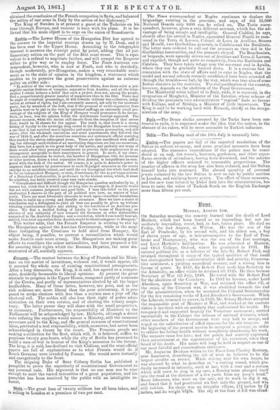The Times correspondent at Naples continues to deplore the brigandage
existing in the province, and says, of the 15,000 National Guards only 8000 can be relied on. The Turin corre- spondent, however, gives a very different account, which has the ad- vantage of being minute and intelligible. General Cialdini, lie says, shortly after his arrival in Naples, appointed General Pinelli to com- mand in the Terra di Lavoro, Colonel de Luca in Avellino, Stocco and Morelli, two Garibaldian generals, in Calabria and the Basilicata. The latter were ordered to call out the peasants as I hey did in the Garibaldian insurrection, and the peasants obeyed. The Bourbonists, or brigands, were speedily driven out of Avellino and Terra di Lavoro, and expelled, though not quite so completely, from the Basilicata and Calabria. They have taken refuge near the sea-coast and in Apulia, where they can be gradually hunted down. It is a curious fact in connexion with the state of affairs said to exist in Naples, that the model and normal schools recently established have been crowded all through the troubles—a fact, by the way, which was true also of some Indian districts in the mutinies. The real pacification of the country, however, depends on the abolition of the Papal Government.
The Ministerial crisis talked of in Italy, ends, it is reported, in the resignation of Minghetti, Minister of the Interior, whose scheme of dividing the peninsula into administrative "regions" finds no favour with Italians, and of Scialoja, a Minister of little importance. The King is said to be working hard with Ricasoli, chiefly at the reorga- nization of the army.






























 Previous page
Previous page